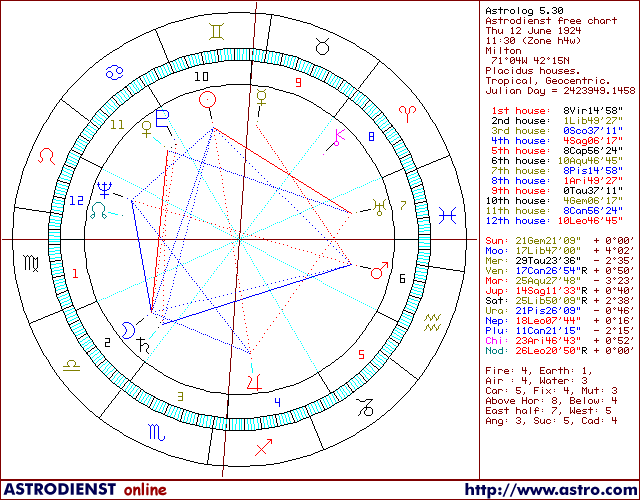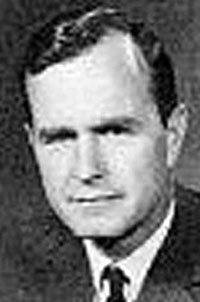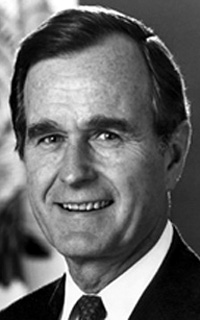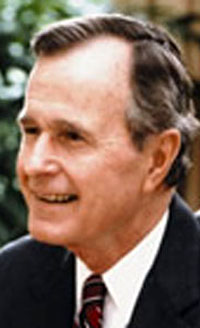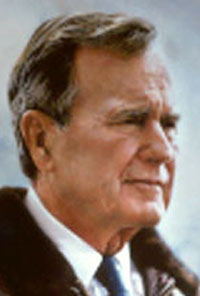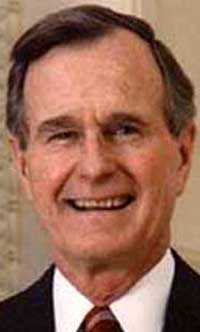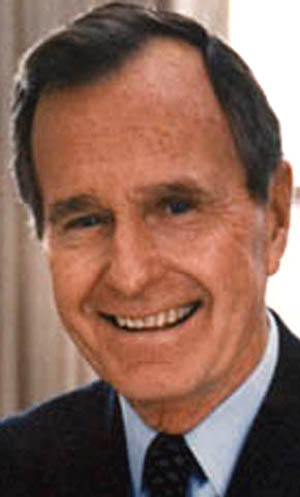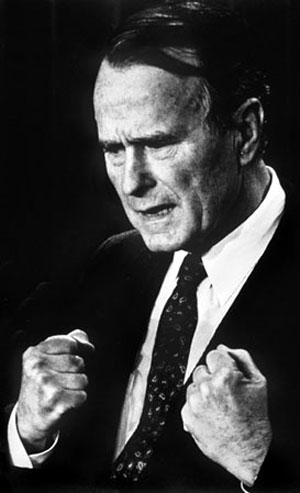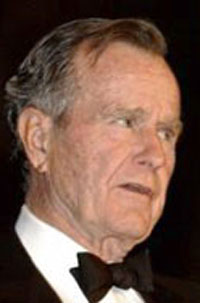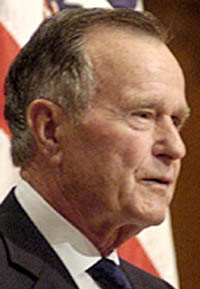Copyright Michael D. Robbins 2005
Astro-Rayological
Interpretation & Charts
Quotes
Biography
Images & Physiognomic Interpretation
America is never wholly herself unless she is engaged in high moral principle. We as a people have such a purpose today. It is to make kinder the face of the nation and gentler the face of the world.
I am not one who - who flamboyantly believes in throwing a lot of words around.
I think I'd be a better president because I was in combat.
I'm going to be so much better a president for having been at the CIA that you're not going to believe it.
It's no exaggeration to say that the undecideds could go one way or another.
My grandkids say, "Reality Bites." O.K., but it also challenges and rewards... I believe our best days are yet to come.
No, I don't know that atheists should be considered as citizens, nor should they be considered as patriots. This is one nation under God.
We are not the sum of our possessions.
We don't want an America that is closed to the world. What we want is a world that is open to America.
What's wrong with being a boring kind of guy?
You cannot be President of the United States if you don't have faith. Remember Lincoln, going to his knees in times of trial in the Civil War and all that stuff.
I will keep America moving forward, always forward—for a better America, for an endless enduring dream and a thousand points of light.
I want a kinder, gentler nation.
We cannot permit the extreme in the environmental movement to shut down the United States. We cannot shut down the lives of many Americans by going to the extreme on the environment.
Let the others have the charisma. I’ve got the class.
The Cold War began with the division of Europe. It can only end when Europe is whole.
American business can out-think, out-work, out-perform any nation in the world. But we can't beat the competition if we don't get in the ball game.
It's family, and it's faith, and it's friends, and it's not the glamour of the Presidency, or the wonder of going to receive the Nobel Prize. All those are important, of course. But maybe it's just that I'm 71 years old now. It's family, and it's faith, and it's friends. I would tell them that. Don't forget that. In your brilliance, don't turn your back on your friends. Don't think you're entitled to something, you're smarter than the next guy.
If I were to give advice to young people, high-achieving young people for example, I'd have to say, don't neglect your family. Politics is important, sitting at the head table is glamorous. Traveling around the world, trying to do something for world peace was wonderful. But . . . Family and friends and faith are what are really matters in life. And I know that. I see it so clearly now.
I take as my guide the hope of a saint: in crucial things, unity. . . in important things, diversity. . . in all things, generosity.
You do not reform a world by ignoring it.
If I've learned anything in the past quarter century, it is that we cannot federalize virtue.
Don't confuse being 'soft' with seeing the other guy's point of view.
“I've often thought that the process of aging could be slowed down if it had to go through Congress.”
“Leadership to me means duty, honor, country. It means character, and it means listening from time to time.”
“Real improvement in our schools is not simply a matter of spending more, it is a matter of expecting more.”
“In this war, some of our best citizens have made the ultimate sacrifice, ... We mourn the loss of every life. We pray for their loved ones, and we will honor their sacrifice by completing the mission and laying the foundation for peace.”
“It breaks my heart to think about a family weeping over the loss of a loved one,”
In office January 20, 1981 – January 20, 1989
President Ronald ReaganGeorge Herbert Walker Bush (born June 12, 1924) was the 41st President of the United States of America (1989–1993). Prior to being President, Bush had served as a U.S. congressman from Texas (1967–1971), ambassador to the United Nations (1971–1973), Republican National Committee chairman (1973–1974), Chief of the U.S. Liaison Office in the People's Republic of China (1974–1976), Director of the Central Intelligence Agency (1976–1977), Chairman of the First International Bank in Houston (1977–1980), and the 43rd Vice President of the United States under President Ronald Reagan (1981–1989). A decorated naval aviator, is the last World War II veteran to have served as President.
President Bush pursued moderate policies in both domestic and foreign policy. During the final days of the Cold War, he was responsible for managing US foreign policy during the delicate transition of the Soviet Union and eastern Europe from being communist states to being liberal democracies. He championed the concept of a New World Order where international law and global consensus would replace military and strategic confrontation as a means of accomplishing diplomatic objectives. This idea was exemplified during the Gulf War, when the U.S. rallied a global coalition to reverse the invasion of Kuwait by Iraq under Saddam Hussein. However, in December 1989, President Bush ordered the invasion of Panama to remove General Manuel Noriega from power without an international consensus. In domestic policy, Bush's most notable initiative was the Omnibus Budget Reconciliation Act of 1990, a controversial compromise with congressional Democrats that traded spending controls for tax increases in order to balance the federal budget.
The Bush political "dynasty" has been compared to that of the Adams and the Kennedy families. Bush is the father of the 43rd and current President George Walker Bush, and the 43rd and current Governor of Florida Jeb Bush. His father, Prescott Bush, was a United States Senator from Connecticut.
George Herbert Walker Bush was born in Milton, Massachusetts to Prescott Bush and Dorothy Walker Bush. He was named for his maternal grandfather, George Herbert Walker, Sr..
Bush began his formal education at the Greenwich Country Day School in Greenwich, Connecticut. Bush attended Phillips Academy in Andover, Massachusetts from 1936 to 1942, where he captained the baseball and soccer teams and was a member of an exclusive fraternity called the A.U.V, or "Auctoritas, Unitas, Veritas" — Latin for "Authority, Unity, Truth". It was while at Phillips Academy that Bush learned of the surprise attack on Pearl Harbor on December 7, 1941.
Bush met Babe Ruth as a student at Yale.After graduating from Phillips Academy in June 1942, Bush joined the U.S. Navy on his 18th birthday to become an aviator. After completing the 10-month course, he was commissioned as an ensign in the U.S. Naval Reserve on June 9, 1943, several days before his nineteenth birthday, which made him the youngest naval aviator to that date.
After finishing flight training, he was assigned to Torpedo squadron (VT-51) as photographic officer in September 1943. As part of Air Group 51, his squadron was based on U.S.S. San Jacinto in the spring of 1944. San Jacinto was part of Task Force 58 that participated in operations against Marcus and Wake Islands in May, and then in the Marianas during June. On June 19 the task force triumphed in one of the largest air battles of World War II. On his return from the mission Bush's aircraft made a hard-forced water landing. A submarine rescued the young pilot, although the plane was lost as well as the life of his navigator. On July 25, Bush and another pilot received credit for sinking a small cargo ship off Palau.
After Bush's promotion to Lieutenant Junior Grade on August 1, San Jacinto commenced operations against the Japanese in the Bonin Islands. On September 2, 1944, Bush piloted one of four aircraft from VT-51 that attacked the Japanese installations on Chichi Jima. For this mission his crew included Radioman Second Class John Delaney and Lieutenant Junior Grade William White, who substituted for Bush's regular gunner. During their attack four TBM Avengers from VT-51 encountered intense anti-aircraft fire.
While starting the attack, Bush's aircraft was hit, and his engine caught on fire. He completed his attack and released the bombs over his target, scoring several damaging hits. With his engine on fire, Bush flew several miles from the island, where he and one other crew member on the TBM Avenger bailed out of the aircraft. However, the other man's parachute did not open, and he fell to his death. It was never determined which man bailed out with Bush. Both Delaney and White were killed in action. While Bush waited four hours in his inflated raft, several fighters circled protectively overhead until he was rescued by the lifeguard submarine U.S.S. Finback. For this action Bush received the Distinguished Flying Cross. During the month he remained on Finback, Bush helped rescue other pilots.
However, some people have expressed skepticism of the official story, asking if Bush bailed out unnecessarily, causing the needless deaths of his crewmates. The primary witness against the official story are Charles Bynum and Chester Mierzejewski.[1][2]
Bush subsequently returned to the San Jacinto in November 1944. He participated in operations in the Philippines. When San Jacinto returned to Guam, the squadron, which had suffered 300 percent casualties of its pilots, was replaced and sent to the United States. Through 1944, he had flown 58 combat missions for which he received the Distinguished Flying Cross, three Air Medals, and the Presidential Unit Citation awarded aboard the San Jacinto.
After this valuable combat experience, Bush was reassigned to Norfolk Navy Base and put in a training wing for new torpedo pilots. He was later assigned as a naval aviator in a new torpedo squadron, VT-153. With the surrender of Japan, he was honorably discharged in September 1945 and then entered Yale University. In 2003, construction began on the USS , the tenth Nimitz-class supercarrier of the United States Navy. Its motto is "Strength in the Pursuit of Peace". It is scheduled for completion in 2009.
Former President George Herbert Walker Bush is listed fourth down.While at Yale, he joined the Delta Kappa Epsilon fraternity and was elected president. He also captained the Yale baseball team. As a left-handed first baseman, Bush played in the first College World Series. As a senior he was, like his son George W. Bush (1968) and his father Prescott S. Bush (1917), inducted into the Skull and Bones secret society in 1948,[3] helping him to build friendships and political support. Skull and Bones members provided support during his presidential campaign rallying huge sums of money for advertisement.
George Bush married Barbara Pierce on January 6, 1945. Their marriage produced six children: George W., Pauline Robinson ("Robin") (1949–1953, died of leukemia), John (Jeb), Neil, Marvin, and Dorothy Walker.
Bush ventured into the highly speculative Texas oil exploration business after World War II with considerable success. He secured a position with Dresser Industries, where his father served on the board for 22 years. His son, Neil Mallon Bush, is named after his employer at Dresser, Neil Mallon, who was a close family friend dating back to Skull & Bones at Yale in 1918 along with Prescott. Zapata Corporation was created by Bush and the Liedtke brothers in 1953 as Zapata Oil. (Authors Kevin Phillips, Daniel Yergin, and others suggest that Bush had undercover ties to the Central Intelligence Agency at this time.) Dresser Industries, decades later, merged with Halliburton, whose former CEOs include Dick Cheney, 's Secretary of Defense and later Vice President of the United States under George W. Bush.
Vice President Bush in a meeting with President Ronald Reagan in 1984.In 1964, Bush ran for the U.S. Senate. In the Republican primary, Bush ran first with 62,985 votes, but his total was 44.1 percent, not the required majority. He was thus forced into a runoff primary with Jack Cox, also of Houston, the 1962 Republican gubernatorial nominee, who had 45,561 votes (31.9 percent) in the primary. A third candidate, Robert Morris of Dallas, who had been a member of the Senate Internal Security Committee and an ardent constitutionalist and "cold warrior," polled 28,279 ballots (19.8 percent).
Bush easily prevailed in the GOP runoff, with 49,751 (62.1 percent) to Cox's 30,333 (37.9 percent). As the Republican nominee, Bush then aimed his campaign at the incumbent Democratic Senator Ralph Yarborough, making an issue of Yarborough's support of the Civil Rights Act of 1964. At the time many Southern politicians (including the Republican Senator John Tower of Texas) opposed the legislation on constitutional or libertarian grounds.
Bush called Yarborough an "extremist" and a "left wing demagogue" while Yarborough said Bush was a "carpetbagger" trying to buy a Senate seat "just as they would buy a seat on the New York Stock Exchange." Bush lost in a Democratic landslide but ran considerably ahead of the GOP presidential nominee, Senator Barry M. Goldwater of Arizona.
Although Bush later became a leader of the Republican party's moderate wing, at the time he was an ultraconservative Goldwater Republican. He campaigned enthusiastically for Barry Goldwater and against Nelson Rockefeller in the race for the Republican presidential nomination in 1964. He also supported prayer in public schools and opposed civil rights (source Chaitkin,Anton, and Tarpley, Webster G. George Bush: The Unauthorized Biography Chapter IX).He and his father Prescott were both close friends of Goldwater and supported him very enthusiastically. He and his father both disliked Rockefeller. He wrote in a letter "Under no circumstances will Texas take Nelson Rockefeller"(Source Bush, George H.W. All the Best)
Bush did not give up on elective politics and was elected in 1966 and 1968 to the House of Representatives from the 7th District of Texas.
In 1970, Bush relinquished his House seat to seek the Republican senatorial nomination. He easily defeated conservative Robert Morris, a defeated 1964 candidate, by a margin of 87.6 percent to 12.4 percent. Bush expected that he would again face Democratic Senator Yarborough. But former Congressman Lloyd Bentsen, a native of Mission, Texas, defeated Yarborough in the Democratic primary, 816,641 votes (53 percent) to 724,122 (47 percent). Yarborough then endorsed Bentsen.
Because there was no presidential election in 1970, turnout in Texas was unusually low in the general election. Bentsen defeated Bush by a margin similar to that in his primary victory over Yarborough. Bentsen later became the Democratic Party nominee for Vice President in the 1988 presidential election and, teamed with Massachusetts Governor Michael Dukakis, lost to Bush. In 1993, Bentsen became Secretary of the Treasury in the Clinton Administration.
During his career in the U.S. House of Representatives, Bush was very supportive of contraceptives and family planning. So much so that he was known as "Rubbers".[4] He was a supporter of Planned Parenthood, of which his father Prescott had been the financial chairman. He criticized Pope Paul VI for his encyclical Humanae Vitae which reiterated the Roman Catholic Church's opposition to contraceptives.[4]
After the 1970 election loss, President Richard Nixon appointed Bush to United States Ambassador to the United Nations, at which he served from 1971 to 1973.
After Nixon was re-elected President in 1972, he asked Bush to become Chairman of the Republican National Committee. Bush held this position during the Watergate scandal, when the popularity of both Nixon and the Republican Party plummeted. Bush defended Nixon steadfastly, but later as Nixon's complicity became clear he focused more on defending the Republican Party while still maintaining loyalty to Nixon.
After Nixon's resignation in 1974, Bush was considered for appointment as the replacement Vice President, but President Gerald Ford chose Nelson Rockefeller instead. Ford appointed Bush to be Chief of the U.S. Liaison Office in the People's Republic of China. (Since the United States at the time maintained official relations with the Republic of China on Taiwan and not the People's Republic of China, the Liaison Office did not have the official status of an embassy and Bush did not formally hold the position of "ambassador" even though he unofficially acted as one.)
In 1976, Ford brought Bush back to Washington to become Director of Central Intelligence. Bush served in this role for 355 days, from January 30, 1976 to January 20, 1977.[5] The CIA had been rocked by a series of revelations, including revelations based on investigations by the Senate's Church Committee, about the CIA's illegal and unauthorized activities, and Bush was credited with helping to restore the agency's morale.[6]
Bush has since commented that he did not particularly enjoy this string of jobs, saying he never wanted to be a "career bureaucrat." However, he based his subsequent rise to national prominence in politics and campaigns for national office in part on the experience he gained from this succession of appointments after his Senate defeat in 1970.
After a Democratic administration took power in 1977, Bush became Chairman of the First International Bank in Houston. He also became an adjunct professor of Administrative Science at Rice University in the Jones School of Business in 1978, the year it opened. The course, Organization Theory, involved lectures from Bush regarding the organizations he headed—the Central Intelligence Agency, the National Republican Party, a U.S. congressional office, the USA Representative Office to China, and an oil exploration company. Just months before Bush hit the presidential campaign trail, he was also candid about his internal debate to enter the primaries.[7]
He also became a board member of the Committee on the Present Danger.
In the 1980 presidential election, Bush ran for the office, stressing his wide range of government experience. In the contest for the Republican Party nomination, despite Bush's establishment backing, the front-runner was Ronald Reagan, former Governor of California who was now running for the third time for President.
In the contest Bush represented the Republican party's eastern establishment liberal-moderate wing, whereas Reagan represented the conservative portion of the Republican Party. Bush attacked Reagan as being 'too' conservative, labeling the latter's supply side-influenced plans for massive tax cuts as "voodoo economics."
Bush won the Iowa caucus to start the primary season, then told the press that he had "Big Mo" (or momentum). However, Reagan came back to decisively win the first primary in New Hampshire, and Bush's "mo" was gone.[8] With a growing popularity among the Republican voting base, Reagan won most of the remaining primaries and the nomination.
During his campaign for the Republican Party's presidential nomination in 1980 Bush criticized Democratic incumbent Jimmy Carter for breaking off diplomatic relations with the anti-communist and fascist Republic of China (Taiwan) and supporting the communist People's Republic of China. Some people accused him of hypocrisy for this because he was very supportive of appeasing the People's Republic of China when he was the USA Ambassador in Beijing. And because he would later support the government of the People's Republic of China during the Tinamen Square Riots. (Source: Chaitkin, Anton, and Tarpley, Webster G. George Bush: The Unauthorized Biography Chapter XVI Campaign 1980)
After some preliminary discussion of choosing former President Gerald Ford as his running mate, Reagan selected Bush as his Vice President, placing him on the winning Republican presidential ticket of 1980. Bush had declared he would never be Reagan's Vice President. Bush was many things Reagan had not been — a life-long Republican, a combat veteran, and an internationalist with UN, CIA, and China experience. Bush was also more moderate in his economic positions and political philosophy than Reagan.
As Vice President, Bush was loyal to Reagan and kept any policy differences hidden. Bush did not wield strong power within the Reagan Administration, but he did have some influence on Reagan's staffing and was given some line responsibilities.[9] Reagan kept Bush busy on overseas diplomatic trips; Bush attended so many state funerals that he famously quipped, "I'm George Bush. You die, I fly."[10]
The Reagan/Bush ticket won again by a huge landslide in 1984 against the Democrats' Walter Mondale/Geraldine Ferraro ticket.
During his second term as Vice President, Bush became the first Vice President to become Acting President when, on July 13, 1985, President Reagan underwent surgery to remove polyps from his colon. Bush served as Acting President for approximately eight hours, most of which he passed playing tennis.
When the Iran-Contra Affair broke in 1986, Bush stated that he had been "out of the loop" and unaware of the Iran initiatives related to arms trading.[11] This claim met with some skepticism, but Bush was never charged with any wrongdoing.
Chief Justice William Rehnquist administering the oath of office to President during Inaugural ceremonies at the United States Capitol. January 20, 1989.In 1988, after nearly eight years as Vice President, Bush again ran for President. Though considered the early frontrunner for the Republican nomination, Bush came in third in the Iowa caucus, beaten by winner U.S. Senator Bob Dole and runner-up televangelist Pat Robertson. However, Bush rebounded to win the New Hampshire primary, partly because of television commercials portraying Dole as a tax raiser. Once the multiple-state primaries such as Super Tuesday began, Bush's organizational strength and fundraising lead were impossible for the other candidates to match, and the nomination was his.
Bush was criticised by some liberals and secularists during the 1988 campaign because he said at a press conference in response to a question from Robert I. Sherman, a reporter for the American Atheist news journal about what he would do to win the votes of American atheists that he thought he had no support in the atheist community and when Sherman asked him if he recognized the equal rights of American atheists Bush replied. "No, I don't know that atheists should be considered as citizens, nor should they be considered patriots, this is one nation under God." (Source: http://www.holysmoke.org/sdhok/aa011.htm)
Leading up to the 1988 Republican National Convention, there was much speculation as to Bush's choice of running mate. In a move anticipated by few and later criticized by many, Bush chose little-known U.S. Senator Dan Quayle of Indiana. On the eve of the convention, Bush trailed Democratic nominee Michael Dukakis, then Massachusetts governor, by double digits in most polls.
Bush, often criticized for his lack of eloquence when compared to Reagan, surprised many by giving perhaps the best speech of his public career, widely known as the "Thousand points of light" speech[12] for his use of that phrase to describe his vision of American community. Bush's acceptance speech and a generally well-managed Convention catapulted him ahead of Dukakis in the polls, and he held the lead for the rest of the race. Bush's acceptance speech at the convention included the famous pledge, Read my lips: no new taxes.
1988 presidential electoral votes by state.The campaign was noted for its highly negative television advertisements. One advertisement run by the Bush campaign showed Dukakis awkwardly riding in a U.S. Army tank. Bush blamed Dukakis for polluting the Boston Harbor as the Massachusetts governor. Bush also pointed out that Dukakis was opposed to the law that would require all students to say the pledge of allegiance. Another, produced and placed by an independent group supporting Bush, referred to murderer Willie Horton, a man who had committed a rape and assault while on a weekend furlough from a life sentence being served in Massachusetts.
Dukakis's unconditional opposition to capital punishment also led to a pointed question during the U.S. presidential debates. Moderator Bernard Shaw asked Dukakis hypothetically if Dukakis would support the death penalty if his wife were raped and murdered. Dukakis's response appeared to many oddly wooden and technical, and helped characterize him as "soft on crime." These images helped enhance Bush's stature as a possible Commander-in-Chief compared to the Massachusetts governor.
Bush beat Michael Dukakis and Lloyd Bentsen soundly in the Electoral College, by 426 to 111 (Bentsen received one vote). In the nationwide popular vote, Bush took 53.4% of the ballots cast while Dukakis gained 45.6%. Bush was the first serving Vice President to be elected President since 1836.
Presidency 1989-1993
Vice President Bush, President Ronald Reagan, and Soviet Premier Mikhail Gorbachev at New York City in 1988[edit]
Policies
Foreign policy drove the Bush presidency from its first days. In his January 20, 1989, Inaugural Address upon taking the Presidency, Bush said, "I come before you and assume the Presidency at a moment rich with promise. We live in a peaceful, prosperous time, but we can make it better. For a new breeze is blowing, and a world refreshed by freedom seems reborn; for in man's heart, if not in fact, the day of the dictator is over. The totalitarian era is passing, its old ideas blown away like leaves from an ancient, lifeless tree. A new breeze is blowing, and a nation refreshed by freedom stands ready to push on. There is new ground to be broken, and new action to be taken."[13]Leading up to the first Gulf War, on September 11, 1990, President Bush addressing a joint session of Congress stated: "Out of these troubled times, our fifth objective — a New World Order — can emerge: a new era"[14]
In a foreign policy move that would later be questioned, President Bush achieved his stated objectives of liberating Kuwait and forcing Iraqi withdrawal, then ordered a cessation of combat operations —allowing Saddam Hussein to stay in power. His Secretary of Defense Dick Cheney noted that invading the country would get the United States "bogged down in the quagmire inside Iraq." Bush later explained that he did not give the order to overthrow the Iraqi government because it would have "incurred incalculable human and political costs... We would have been forced to occupy Baghdad and, in effect, rule Iraq".[16][17]
In explaining to Gulf War veterans why he chose not to pursue the war further, President Bush said, "Whose life would be on my hands as the commander-in-chief because I, unilaterally, went beyond the international law, went beyond the stated mission, and said we're going to show our macho? We're going into Baghdad. We're going to be an occupying power — America in an Arab land — with no allies at our side. It would have been disastrous."[18]
President Bush's popularity rating in America soared during and immediately after the apparent success of the military operations, but it later fell dramatically because of an economic recession.
New World Order
As the Soviet Union was unraveling, President Bush and Soviet President Mikhail Gorbachev declared a U.S.-Soviet strategic partnership at the summit of July 1991, decisively marking the end of the Cold War. President Bush declared that U.S.-Soviet cooperation during the Persian Gulf War in 1990–1991 had laid the groundwork for a partnership in resolving bilateral and world problems.NAFTA Initialing Ceremony, October 1992. From left to right: (standing) President Carlos Salinas, President Bush, Prime Minister Brian Mulroney; (seated) Jaime Serra Puche, Carla Hills, Michael Wilson.Bush's government, along with the Progressive Conservative Canadian Prime Minister Brian Mulroney, spearheaded the negotiations of the North American Free Trade Agreement (NAFTA), which Bill Clinton signed in 1993.
Despite his defeat, George H.W. Bush left office in 1993 with a 56 percent job approval rating.[20]
Since his final election campaign, Bush has mostly retired from public life. He and his wife live most of the year at their home in Tanglewood in Houston, with a presidential office nearby, and the remainder at their summer home Walker's Point in Kennebunkport, Maine. He holds his own fishing tournament in Islamorada, an island in the Florida Keys.
In April 1993, the Iraqi Intelligence Service attempted to assassinate former President Bush via car bomb during a visit to Kuwait. However, Kuwaiti security foiled the car bomb plot. On June 26, 1993, the U.S. launched a missile attack targeting Baghdad intelligence headquarters in retaliation for the attempted attack against Bush.
Bush has never written a memoir of his political life, and says he does not plan to write one. He has, however, published a book containing a series of collected letters (All The Best, George Bush, 1999), and co-authored a book on recent foreign policy issues with his former National Security Advisor, Brent Scowcroft (A World Transformed, 1998). He has given numerous speeches and participated in business ventures with the Carlyle Group, a private equity fund with close ties to the government of Saudi Arabia.
Robert Parry, an American investigative journalist, and others have criticized Bush's allegedly close relationship with Sun Myung Moon, a controversial religious figure.[1]
Bush, along with his son President George W. Bush, his daughter-in-law, Laura, and former President Bill Clinton, pay their respects to Pope John Paul II before the pope's funeral.On June 12, 2004, he went skydiving in honor of his 80th birthday. It was his third parachute jump since World War II. He also made a jump on June 9, 1999, before his 75th birthday, and told reporters then he had also parachuted in Arizona two years earlier. The day before his 80th birthday jump, he and his son both took part in eulogizing his predecessor, Ronald Reagan, at the latter's state funeral.
On November 22, 2004, New York Republican Governor George Pataki named Bush and the other living former Presidents (Gerald Ford, Jimmy Carter, and Bill Clinton) as honorary members of the board rebuilding the World Trade Center.
On January 3, 2005, Bush and Bill Clinton were named by the current President Bush to lead a nationwide campaign to help the victims of the Indian Ocean tsunami. Bush and Clinton both appeared on the Super Bowl XXXIX pre-game show on Fox in support of their bipartisan effort to raise money for relief of the disaster through the USA Freedom Corps, an action which Bush described as "transcending politics." Thirteen days later, they both traveled to the affected areas to see how the relief efforts are going.
In August 31, 2005, following the devastation of the Gulf Coast by Hurricane Katrina, Bush again teamed with Clinton to coordinate private relief donations. Reports were common that Bush and Clinton had developed a friendship by now, despite the latter having defeated the former in the 1992 election. (Such friendships were not unknown, as Gerald Ford and Jimmy Carter had developed one despite a similar history.). Almost a year later, on May 13, 2006, they received Honorary Diplomas from Tulane University at the school's commencement ceremony.
Bush and his wife Barbara could also be seen sitting in the front row behind home plate at Minute Maid Park in Houston, supporting the Houston Astros during the 2005 World Series.
George Bush brought to the White House a dedication to traditional American values and a determination to direct them toward making the United States "a kinder and gentler nation." In his Inaugural Address he pledged in "a moment rich with promise" to use American strength as "a force for good."
Coming from a family with a tradition of public service, George Herbert Walker Bush felt the responsibility to make his contribution both in time of war and in peace. Born in Milton, Massachusetts, on June 12, 1924, he became a student leader at Phillips Academy in Andover. On his 18th birthday he enlisted in the armed forces. The youngest pilot in the Navy when he received his wings, he flew 58 combat missions during World War II. On one mission over the Pacific as a torpedo bomber pilot he was shot down by Japanese antiaircraft fire and was rescued from the water by a U. S. submarine. He was awarded the Distinguished Flying Cross for bravery in action.
Bush next turned his energies toward completing his education and raising a family. In January 1945 he married Barbara Pierce. They had six children-- George, Robin (who died as a child), John (known as Jeb), Neil, Marvin, and Dorothy.
At Yale University he excelled both in sports and in his studies; he was captain of the baseball team and a member of Phi Beta Kappa. After graduation Bush embarked on a career in the oil industry of West Texas.
Like his father, Prescott Bush, who was elected a Senator from Connecticut in 1952, George became interested in public service and politics. He served two terms as a Representative to Congress from Texas. Twice he ran unsuccessfully for the Senate. Then he was appointed to a series of high-level positions: Ambassador to the United Nations, Chairman of the Republican National Committee, Chief of the U. S. Liaison Office in the People's Republic of China, and Director of the Central Intelligence Agency.
In 1980 Bush campaigned for the Republican nomination for President. He lost, but was chosen as a running mate by Ronald Reagan. As Vice President, Bush had responsibility in several domestic areas, including Federal deregulation and anti-drug programs, and visited scores of foreign countries. In 1988 Bush won the Republican nomination for President and, with Senator Dan Quayle of Indiana as his running mate, he defeated Massachusetts Governor Michael Dukakis in the general election.
Bush faced a dramatically changing world, as the Cold War ended after 40 bitter years, the Communist empire broke up, and the Berlin Wall fell. The Soviet Union ceased to exist; and reformist President Mikhail Gorbachev, whom Bush had supported, resigned. While Bush hailed the march of democracy, he insisted on restraint in U. S. policy toward the group of new nations.
In other areas of foreign policy, President Bush sent American troops into Panama to overthrow the corrupt regime of General Manuel Noriega, who was threatening the security of the canal and the Americans living there. Noriega was brought to the United States for trial as a drug trafficker.
Bush's greatest test came when Iraqi President Saddam Hussein invaded Kuwait, then threatened to move into Saudi Arabia. Vowing to free Kuwait, Bush rallied the United Nations, the U. S. people, and Congress and sent 425,000 American troops. They were joined by 118,000 troops from allied nations. After weeks of air and missile bombardment, the 100-hour land battle dubbed Desert Storm routed Iraq's million-man army.
Despite unprecedented popularity from this military and diplomatic triumph, Bush was unable to withstand discontent at home from a faltering economy, rising violence in inner cities, and continued high deficit spending. In 1992 he lost his bid for reelection to Democrat William Clinton.
